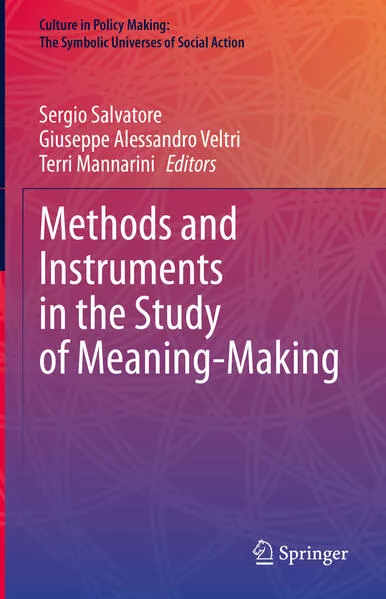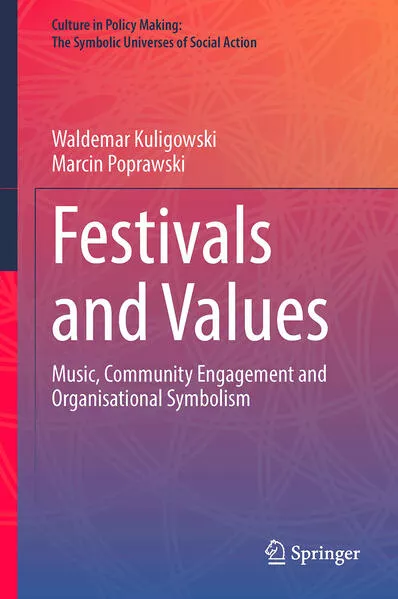Culture in Policy Making: The Symbolic Universes of Social Action
Methods and Instruments in the Study of Meaning-Making
Chronologie aller Bände (1 - 2)
Die Reihenfolge beginnt mit dem Buch "Methods and Instruments in the Study of Meaning-Making". Wer alle Bücher der Reihe nach lesen möchte, sollte mit diesem Band von Sergio Salvatore beginnen. Der zweite Teil der Reihe "Methods and Instruments in the Study of Meaning-Making" ist am 10.03.2024 erschienen. Die Reihe umfasst derzeit 2 Bände. Der neueste Band trägt den Titel "Festivals and Values".
- Anzahl der Bewertungen für die gesamte Reihe: 0
- Ø Bewertung der Reihe: 0
- Start der Reihe: 27.03.2023
- Neueste Folge: 28.11.2024
Diese Reihenfolge enthält 2 unterschiedliche Autoren.
- Autor: Salvatore, Sergio
- Anzahl Bewertungen: 0
- Ø Bewertung:
- Medium: Buch
- Veröffentlicht: 27.03.2023
- Genre: Politik
Methods and Instruments in the Study of Meaning-Making
This volume develops a theoretical framework for the modelling of meaning-making and cultural processes as crucial to the scientific study of contemporary complex societies. It focuses on the methodological and empirical aspects of the analysis of culture and its dynamics that could be applied to policymaking and to the understanding of social phenomena. It covers culture-based segmentation, ad hoc survey instruments like the VOC and PROSERV questionnaires, discourse flow analysis, the Homogenization of Classification Functions Measurement, and others. It also presents a detailed discussion of the methodology of cultural analysis in contexts of health and education. The volume showcases a top-down approach by including quantitative methods and/or automatized or semi-automatized procedures, and at the same time supports a hermeneutic, bottom-up, abductive approach, focused on the situated dynamics of meaning-making. It provides insights from cultural studies, socialstatistics, social policy, and research methodology in the social sciences. This is a useful resource for academics involved in studying cultural dynamics and for policy-oriented researchers and decision-makers who are interested in cultural dimensions of the design, implementation and reception of public policies.
- Autor: Kuligowski, Waldemar
- Anzahl Bewertungen: 0
- Ø Bewertung:
- Medium: Buch
- Veröffentlicht: 02.11.2023
- Genre: Politik
Festivals and Values
This is an original book, covering all the past areas of research anyone would need to know about festivals and ‘event-based culture’. It is based on academic research but written in a way relevant for cultural professionals – uniquely explaining the cultural power of festivals, and with original empirical research, the realities of organisation and management, and social and economic value.
Dr Jonathan Vickery, Reader in Cultural Policy Studies and Director: Centre for Cultural and Media Policy Studies, Univeristy of Warwick.
This book discusses music festivals in the context of the specific values they convey. Today, music festivals are a permanent feature of national, regional and local cultural policies, a valuable asset in the tourism industry and a significant source of income for an industry that has been adversely affected by the steady decline in physical sales of music. For the audience, on the other hand, it is an opportunity to escape from everyday life, multi-sensory contact with art, an activity that stands for “full-body participation”– a cultural phenomenon that drags people out of their homes like no other. There is one common denominator linking the above-mentioned features of contemporary music festivals – namely the world of values. This is evident from the non-accidental locations, festivals spaces’ design, planning and the line-ups created consciously, with great care. The organisers’ “missions”, logos, and other symbolic organisational artefacts communicate specific values. These values are explicitly mentioned by artists and audiences: they can be easily identified in online forums and media reports; participant behaviour, festival “rituals” and additional festival programs are shaped on the basis of values, and cooperation is built between the festival and the local community.
As the reader will quickly realize, numbers and statistics sit alongside descriptions and quotations in this book, and the organisers’ statements are accompanied by the opinions of academics, but above all the festival audience is given a voice – both through quotations and their drawings. This voice is by no means uniform, as it turned out that research into values was often transformed into a pretext for spinning tales about one’s life situation, one’s political preferences, and one’s understanding of freedom and responsibility. Memories were mixed with declarations, joy with regret, curses with dreams, prose with poetry. Thomas Pettitt was not wrong in noting that “Social history has learnt to appreciate festival as a valuable window on society and its structures”. The authors have tried to open all the windows available.
Students and researchers in the fields of cultural anthropology, social psychology, folklore studies, comparative religion, sociology of culture, cultural policy, cultural history, and cultural management will find this book highly interesting.

